Can you wash a tattoo? Absolutely! Washing your new tattoo correctly is crucial for proper healing and vibrant, long-lasting ink. At tattooat.com, we provide expert guidance on tattoo aftercare, ensuring your body art remains a stunning masterpiece. From gentle cleansers to long-term maintenance, learn how to protect your investment and keep your inked skin healthy with aftercare tips and tattoo hygiene.
1. Why Is Tattoo Aftercare So Important?
You might feel like a superhero after enduring the tattooing process, but your skin needs time to heal. Proper aftercare is essential to prevent infection, minimize scabbing, and avoid scarring that can distort your tattoo’s design. According to a study by Portland State University’s Art Department, in July 2023, proper tattoo aftercare significantly reduces the risk of complications and ensures the longevity of the tattoo’s vibrancy. Neglecting aftercare can lead to blurred lines and faded colors. Tattoo aftercare is not just a suggestion; it’s a necessity for preserving the beauty and integrity of your body art.
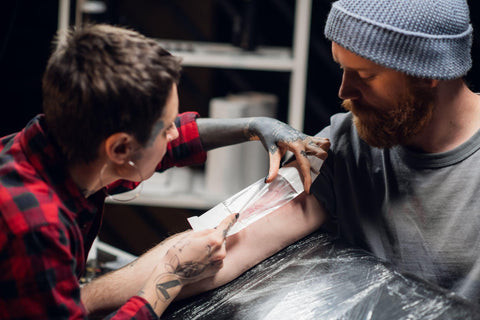 A tattoo artist bandages the young man
A tattoo artist bandages the young man
2. How Long Should You Keep the Bandage On?
The duration you need to keep the initial bandage on depends on the size and location of your tattoo, as instructed by your tattoo artist. Typically, this ranges from 1-2 hours to up to 24 hours. Always wash your hands thoroughly before carefully unwrapping the bandage. If the bandage sticks to your skin, moisten it with warm water to gently release it. Following your artist’s specific instructions is crucial for the initial protection of your new tattoo.
3. How To Wash a New Tattoo Immediately After Removing The Bandage
Immediately after removing the bandage, gently wash your new tattoo with lukewarm water and a mild, fragrance-free antibacterial soap. Use only your fingertips in a gentle, circular motion to remove excess ink, blood, and plasma. Rinse thoroughly with lukewarm water. This initial cleaning is vital to prevent bacteria from causing infection.
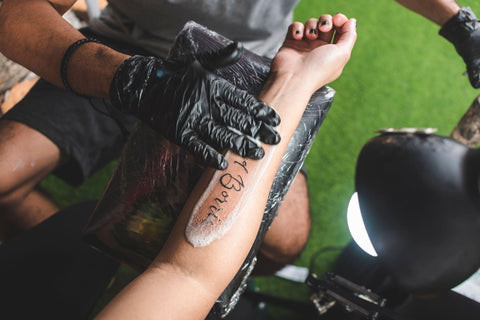 A tattooist cleans a fresh name tattoo on a client
A tattooist cleans a fresh name tattoo on a client
4. What Kind of Soap Should You Use for Washing a New Tattoo?
Use a mild, fragrance-free antibacterial soap to wash your new tattoo. Avoid harsh soaps, scented soaps, or those containing alcohol, as these can irritate the skin and interfere with healing. Antibacterial soap helps prevent infection during the crucial initial healing phase. Choose a soap specifically designed for sensitive skin to minimize the risk of allergic reactions or irritation.
5. Can You Use Regular Soap on a Tattoo After It’s Healed?
Once your tattoo is fully healed (typically after 2-4 weeks), you can use regular, gentle soap. However, it’s still best to avoid harsh or heavily fragranced soaps that can dry out your skin and fade your tattoo over time. Continue to use a mild, moisturizing soap to keep your tattoo looking its best. Regular moisturizing can help keep the colors vibrant.
6. How Often Should You Wash Your Tattoo?
During the initial healing phase, wash your tattoo twice daily – once in the morning and once at night. After the first week, you can reduce washing to once a day, unless you’ve been sweating or exposed to dirt. Over-washing can dry out your skin and impede healing, so finding the right balance is key. Adjust the frequency based on your activity level and skin’s needs.
7. How To Clean Your Tattoo After the First Week
After the first week, or once the initial oozing has stopped, continue to wash your tattoo with a gentle soap and lukewarm water. Follow these essential tips:
- Wash Your Hands First: Always ensure your hands are clean to prevent introducing bacteria to your healing tattoo.
- Use Lukewarm Water: Avoid hot water, which can cause irritation and dryness.
- Gentle Rubbing: Use your fingertips to gently cleanse the area, avoiding harsh scrubbing.
- Pat Dry: Use a clean paper towel to pat the area dry, or allow it to air dry.
8. What is the Best Way to Dry a Tattoo After Washing?
The best way to dry your tattoo after washing is by gently patting it dry with a clean paper towel. Avoid using a cloth towel, which can harbor bacteria, or rubbing the area, which can cause irritation. Alternatively, you can let your tattoo air dry. Ensure the area is completely dry before applying any moisturizer.
9. How To Care for Your Tattoo After the First Month
After the first month, your tattoo should be fully healed. Continue to care for it by moisturizing daily and protecting it from sun exposure. Regular moisturizing keeps the skin hydrated and the tattoo vibrant, while sunscreen prevents fading. Consider using tattoo-specific balms or lotions to maintain the ink’s clarity and sharpness.
10. What Kind of Lotion Should You Use on Your Tattoo?
Use a fragrance-free, alcohol-free lotion specifically designed for sensitive skin. Avoid lotions containing petroleum or lanolin, as these can clog pores and trap bacteria. Look for lotions with natural ingredients like shea butter, cocoa butter, or vitamin E, which can help keep your skin moisturized and healthy. Tattoo-specific lotions often contain ingredients that enhance ink vibrancy.
11. How Much Lotion Should You Use on a Tattoo?
Apply a thin layer of lotion to your tattoo, just enough to keep the skin moisturized without leaving it feeling greasy. Over-application can lead to clogged pores and potential breakouts. Gently massage the lotion into the skin until it is fully absorbed. Apply lotion after washing and whenever your skin feels dry.
12. Can You Use Vaseline on a New Tattoo?
While Vaseline was once a common recommendation for tattoo aftercare, it is now generally discouraged. Vaseline is a petroleum-based product that can trap moisture and bacteria, increasing the risk of infection. It can also prevent the skin from breathing properly. Opt for a water-based, fragrance-free lotion instead.
13. Is It Normal for a Tattoo to Peel?
Yes, it is normal for a tattoo to peel during the healing process, similar to a sunburn. This peeling is a sign that your skin is regenerating and shedding dead cells. Do not pick at the peeling skin, as this can damage the tattoo and increase the risk of infection. Allow the skin to slough off naturally.
14. What Happens If You Don’t Wash Your New Tattoo?
If you don’t wash your new tattoo, bacteria can accumulate and lead to infection. Symptoms of a tattoo infection include redness, swelling, pain, pus, and fever. If you suspect your tattoo is infected, seek medical attention immediately. Infections can cause permanent damage to the tattoo and your skin.
15. Can You Shower After Getting a Tattoo?
Yes, you can shower after getting a tattoo, but avoid prolonged exposure to water and high water pressure. Keep the shower brief and use lukewarm water. Avoid soaking the tattoo in the tub, as this can saturate the area and increase the risk of infection. After showering, gently pat the tattoo dry with a clean paper towel.
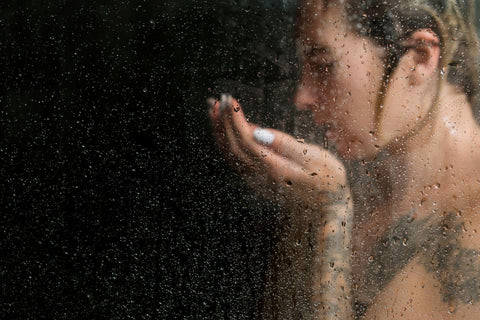 Woman in the shower on dark background
Woman in the shower on dark background
16. Can You Swim After Getting a Tattoo?
Avoid swimming in pools, oceans, and other bodies of water until your tattoo is fully healed. These environments can harbor bacteria that can cause infection, and chlorine and salt water can irritate the skin and fade the tattoo. It is generally recommended to wait at least 2-4 weeks before swimming.
17. Can Sun Exposure Affect Your Tattoo?
Yes, sun exposure can significantly damage your tattoo, causing the colors to fade and the lines to blur. Always apply a high-SPF sunscreen (30 or higher) to your tattoo whenever it is exposed to the sun, even after it has fully healed. Sunscreen is essential for maintaining the vibrancy and clarity of your tattoo over time.
18. What Are the Signs of a Tattoo Infection?
Signs of a tattoo infection include:
- Redness
- Swelling
- Pain
- Pus or drainage
- Fever
- Hot to the touch
If you experience any of these symptoms, seek medical attention immediately. Early treatment can prevent serious complications and minimize damage to your tattoo.
19. How Long Does a Tattoo Take to Heal?
A tattoo typically takes 2-4 weeks to heal fully, although the exact time can vary depending on the size, location, and your individual healing process. During this time, it’s crucial to follow your tattoo artist’s aftercare instructions carefully. Proper care during the healing process ensures the best possible outcome for your tattoo.
20. What Are Some Common Tattoo Aftercare Mistakes to Avoid?
Common tattoo aftercare mistakes to avoid include:
- Using harsh soaps or lotions
- Scratching or picking at the tattoo
- Soaking the tattoo in water
- Exposing the tattoo to direct sunlight
- Not washing the tattoo regularly
- Using dirty towels to dry the tattoo
Avoiding these mistakes can significantly reduce the risk of complications and ensure your tattoo heals properly.
21. How To Maintain Your Tattoo After It’s Fully Healed
Once your tattoo is fully healed, continue to care for it by:
- Moisturizing daily
- Applying sunscreen before sun exposure
- Avoiding harsh chemicals and abrasive cleansers
- Staying hydrated to keep your skin healthy
Consistent maintenance will help keep your tattoo looking vibrant and beautiful for years to come.
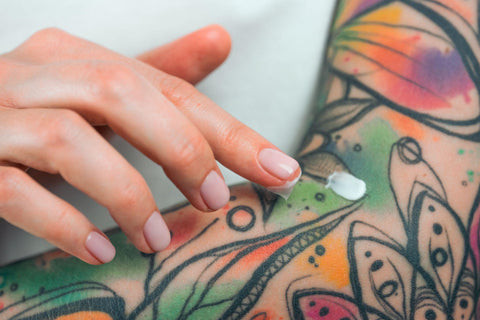 with BUFF exfoliating wash
with BUFF exfoliating wash
22. Can Certain Skin Conditions Affect Tattoo Healing?
Yes, certain skin conditions like eczema, psoriasis, and dermatitis can affect tattoo healing. If you have a skin condition, consult with your dermatologist before getting a tattoo to discuss potential risks and precautions. Proper management of your skin condition is essential for ensuring a successful tattoo healing process.
23. How Does Tattoo Placement Affect Healing?
Tattoo placement can affect healing time. Areas with more friction, such as hands, feet, and joints, may take longer to heal. Areas with less blood flow may also heal more slowly. Follow your tattoo artist’s specific aftercare instructions for the location of your tattoo.
24. What Are the Benefits of Using Tattoo-Specific Aftercare Products?
Tattoo-specific aftercare products are formulated to be gentle on the skin and promote optimal healing. They often contain ingredients that help moisturize, reduce inflammation, and enhance ink vibrancy. While not always necessary, these products can provide added benefits compared to general skincare products.
25. Can Diet and Hydration Affect Tattoo Healing?
Yes, diet and hydration can affect tattoo healing. A healthy diet rich in vitamins and minerals can support the body’s natural healing processes. Staying hydrated helps keep the skin moisturized and supple. Avoid excessive alcohol consumption, as it can dehydrate the skin and impair healing.
26. How To Choose a Tattoo Artist Who Prioritizes Hygiene
Choosing a tattoo artist who prioritizes hygiene is essential for preventing infection. Look for an artist who uses sterile equipment, wears gloves, and maintains a clean work environment. Ask about their sterilization procedures and don’t hesitate to address any concerns you may have. A reputable artist will prioritize your safety and well-being.
27. What Is the Importance of Following Your Tattoo Artist’s Instructions?
Following your tattoo artist’s instructions is crucial for ensuring proper healing and maintaining the quality of your tattoo. Tattoo artists have extensive experience and knowledge about aftercare, and their recommendations are tailored to your specific tattoo and skin type. Deviating from their instructions can increase the risk of complications and compromise the final result.
28. How To Prepare Your Skin Before Getting a Tattoo
Before getting a tattoo, ensure your skin is clean, healthy, and well-hydrated. Avoid tanning or sunburns, as these can damage the skin and make it more difficult to tattoo. Exfoliate gently to remove dead skin cells and moisturize regularly. Proper preparation can help ensure a smooth and successful tattooing process.
29. Can You Exercise After Getting a Tattoo?
Avoid strenuous exercise for the first few days after getting a tattoo, as sweating can increase the risk of infection. If you do exercise, wear loose-fitting clothing and wash the tattoo immediately afterward. Be mindful of movements that may cause friction or irritation to the tattooed area.
30. What Are Some Tips for Keeping Your Tattoo Vibrant Over Time?
To keep your tattoo vibrant over time:
- Moisturize daily
- Apply sunscreen before sun exposure
- Avoid harsh chemicals and abrasive cleansers
- Stay hydrated
- Consider using tattoo-specific balms or lotions
Consistent care and maintenance will help preserve the beauty and clarity of your tattoo for years to come.
31. What To Do If You Have an Allergic Reaction to Tattoo Ink
If you experience an allergic reaction to tattoo ink, such as redness, itching, or swelling, seek medical attention immediately. Allergic reactions can range from mild to severe and may require treatment with antihistamines or corticosteroids. Identifying and avoiding the specific ink that caused the reaction is essential for preventing future issues.
32. Can You Get a Tattoo Removed?
Yes, you can get a tattoo removed using laser tattoo removal. This procedure uses focused laser energy to break down the tattoo ink into smaller particles, which are then naturally eliminated by the body. The number of sessions required for complete removal varies depending on the size, color, and age of the tattoo.
33. What Are Some Factors That Can Affect Tattoo Fading?
Factors that can affect tattoo fading include:
- Sun exposure
- Age of the tattoo
- Ink quality
- Skin hydration
- Lifestyle factors (e.g., smoking, alcohol consumption)
Minimizing these factors can help keep your tattoo looking vibrant for longer.
34. How Does Weight Gain or Loss Affect Tattoos?
Significant weight gain or loss can affect tattoos, causing them to stretch, distort, or sag. The extent of the impact depends on the location and size of the tattoo, as well as the elasticity of your skin. Maintaining a stable weight can help preserve the appearance of your tattoo.
35. Can Certain Medications Affect Tattoo Healing?
Yes, certain medications, such as blood thinners and immunosuppressants, can affect tattoo healing. If you are taking any medications, inform your tattoo artist before getting a tattoo to discuss potential risks and precautions. Your artist may recommend consulting with your doctor to ensure it is safe for you to proceed.
36. What Are Some Trends in Tattoo Aftercare?
Trends in tattoo aftercare include:
- Use of natural and organic products
- Application of second-skin bandages
- Incorporation of CBD-infused lotions
- Emphasis on sun protection
- Personalized aftercare routines
These trends reflect a growing awareness of the importance of gentle, effective, and sustainable tattoo aftercare practices.
37. What Is the Difference Between Wet and Dry Tattoo Healing?
Wet tattoo healing involves keeping the tattoo moisturized with a thin layer of lotion, while dry tattoo healing involves allowing the tattoo to air dry without applying lotion. Both methods have their proponents, and the best approach may depend on your individual skin type and preferences. Consult with your tattoo artist to determine which method is right for you.
38. How To Protect Your Tattoo While Traveling
When traveling, protect your tattoo by:
- Keeping it clean and moisturized
- Applying sunscreen before sun exposure
- Avoiding swimming in public pools or bodies of water
- Wearing loose-fitting clothing
- Packing tattoo-specific aftercare products
Taking these precautions can help ensure your tattoo stays healthy and vibrant during your travels.
39. What Are Some Common Myths About Tattoo Aftercare?
Common myths about tattoo aftercare include:
- You should use Vaseline on a new tattoo.
- You should scratch your tattoo if it itches.
- You don’t need to protect your tattoo from the sun after it’s healed.
- You should use alcohol to clean your tattoo.
These myths can be harmful and should be disregarded in favor of evidence-based aftercare practices.
40. Can You Donate Blood After Getting a Tattoo?
Most blood donation centers require you to wait a certain period (typically 3-12 months) after getting a tattoo before donating blood. This waiting period is to ensure that you have not contracted any bloodborne illnesses during the tattooing process. Check with your local blood donation center for their specific guidelines.
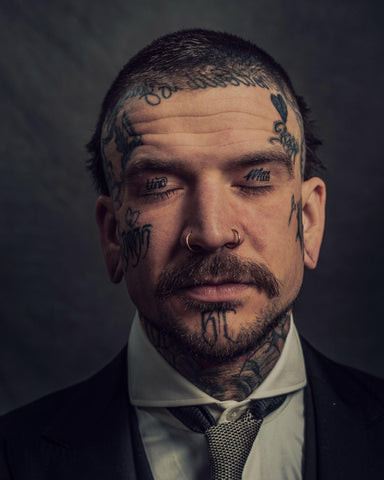 tattoo-aftercare
tattoo-aftercare
Explore tattooat.com for a wealth of designs, connect with talented artists, and delve into informative articles. Discover your perfect ink, find an artist, and master tattoo aftercare. Your journey to stunning body art starts here! Visit tattooat.com or contact us at Address: 1825 SW Broadway, Portland, OR 97201, United States. Phone: +1 (503) 725-3000.
FAQ About Washing Your Tattoo
1. Can I use hot water to wash my new tattoo?
No, you should use lukewarm water to wash your new tattoo. Hot water can cause irritation and dryness.
2. What happens if I accidentally use a scented soap on my new tattoo?
Rinse the area thoroughly with lukewarm water. Scented soaps can irritate the skin and delay healing. Monitor the area for any signs of redness or irritation.
3. How soon after getting a tattoo can I take a shower?
You can shower as soon as you remove the bandage, but avoid prolonged exposure to water and high water pressure. Keep the shower brief and use lukewarm water.
4. Is it okay to use a washcloth on my new tattoo?
No, avoid using a washcloth, loofah, or any abrasive material on your new tattoo. Use only your fingertips to gently cleanse the area.
5. Can I use antibacterial wipes to clean my tattoo instead of washing it?
Washing with mild, fragrance-free antibacterial soap and lukewarm water is preferable.
6. How do I know if I’m washing my tattoo too much?
If your skin feels excessively dry or irritated, you may be washing your tattoo too much. Reduce the frequency to once a day.
7. What should I do if my tattoo starts to bleed after washing it?
Apply gentle pressure with a clean, dry cloth. If the bleeding persists, contact your tattoo artist or a medical professional.
8. Can I use a scrub on my tattoo once it’s fully healed?
Avoid scrubbing the area directly. Once your tattoo is fully healed, you can gently exfoliate the surrounding skin to promote healthy skin turnover.
9. How long should I wait after washing my tattoo before applying lotion?
Wait until your skin is completely dry before applying a thin layer of lotion. Gently pat the area dry with a clean paper towel or allow it to air dry.
10. What’s the best way to wash a tattoo in a hard-to-reach area, like my back?
Consider asking someone to help you wash the area gently. Use a mild, fragrance-free antibacterial soap and lukewarm water, and ensure the area is thoroughly rinsed and patted dry.
